23愚公移山
- 格式:docx
- 大小:61.72 KB
- 文档页数:2
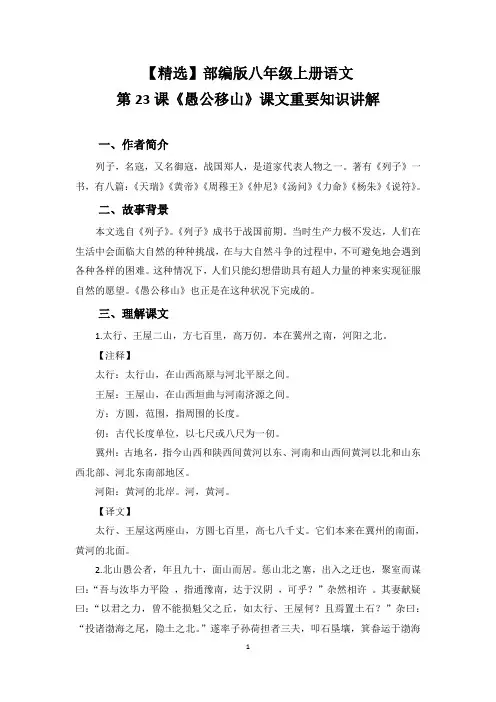
【精选】部编版八年级上册语文第23课《愚公移山》课文重要知识讲解一、作者简介列子,名寇,又名御寇,战国郑人,是道家代表人物之一。
著有《列子》一书,有八篇:《天瑞》《黄帝》《周穆王》《仲尼》《汤问》《力命》《杨朱》《说符》。
二、故事背景本文选自《列子》。
《列子》成书于战国前期。
当时生产力极不发达,人们在生活中会面临大自然的种种挑战,在与大自然斗争的过程中,不可避免地会遇到各种各样的困难。
这种情况下,人们只能幻想借助具有超人力量的神来实现征服自然的愿望。
《愚公移山》也正是在这种状况下完成的。
三、理解课文1.太行、王屋二山,方七百里,高万仞。
本在冀州之南,河阳之北。
【注释】太行:太行山,在山西高原与河北平原之间。
王屋:王屋山,在山西垣曲与河南济源之间。
方:方圆,范围,指周围的长度。
仞:古代长度单位,以七尺或八尺为一仞。
冀州:古地名,指今山西和陕西间黄河以东、河南和山西间黄河以北和山东西北部、河北东南部地区。
河阳:黄河的北岸。
河,黄河。
【译文】太行、王屋这两座山,方圆七百里,高七八千丈。
它们本来在冀州的南面,黄河的北面。
2.北山愚公者,年且九十,面山而居。
惩山北之塞,出入之迂也,聚室而谋曰:“吾与汝毕力平险,指通豫南,达于汉阴,可乎?”杂然相许。
其妻献疑曰:“以君之力,曾不能损魁父之丘,如太行、王屋何?且焉置土石?”杂曰:“投诸渤海之尾,隐土之北。
”遂率子孙荷担者三夫,叩石垦壤,箕畚运于渤海之尾。
邻人京城氏之孀妻有遗男,始龀,跳往助之。
寒暑易节,始一反焉。
杂曰:“投诸渤海之尾,隐土之北。
”遂率子孙荷担者三夫,叩石垦壤,箕畚运于渤海之尾。
【注释】且:将要,快要。
面:面对。
惩:苦于。
迂:曲折,绕远。
塞:阻塞。
室:家人。
谋:谋划,商量办法。
汝:你,这里指你们。
指:直。
毕:尽,全。
险:险阻。
这里指险峻的大山。
豫:豫州,古地名,在今河南黄河以南。
杂然:皆,共同。
许:赞同。
献疑:提出疑问。
以:凭借。
曾:竟,却。
与“不”连用,起加强语气的作用。
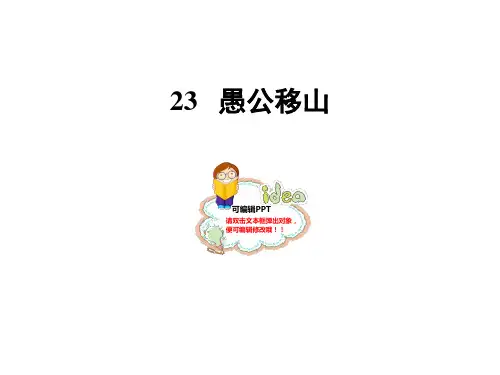
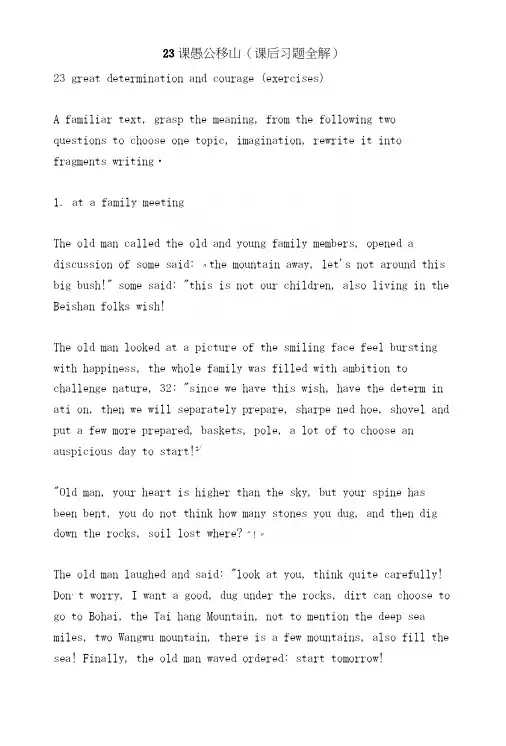
23课愚公移山(课后习题全解)23 great determination and courage (exercises)A familiar text, grasp the meaning, from the following two questions to choose one topic, imagination, rewrite it into fragments writing・1.at a family meetingThe old man called the old and young family members, opened a discussion of some said: 〃the mountain away, let's not around this big bush!" some said: "this is not our children, also living in the Beishan folks wish!The old man looked at a picture of the smiling face feel bursting with happiness, the whole family was filled with ambition to challenge nature, 32: "since we have this wish, have the determ in ati on, then we will separately prepare, sharpe ned hoe, shovel and put a few more prepared, baskets, pole, a lot of to choose an auspicious day to start!z/"Old man, your heart is higher than the sky, but your spine has been bent, you do not think how many stones you dug, and then dig down the rocks, soil lost where?“!〃The old man laughed and said: "look at you, think quite carefully! Don,t worry, I want a good, dug under the rocks, dirt can choose to go to Bohai, the Tai hang Mountain, not to mention the deep sea miles, two Wangwu mountain, there is a few mountains, also fill the sea! Finally, the old man waved ordered: start tomorrow!The wise old man of 2.The idea, the foolish old man and family day to day work・ Bei jing,s neighbor was a widow, she has just teeth son, bounce to help.Hequ is a wise old man, old man to hear the mountains, then ran to stop, said: "how can you be so silly! People are so old, and not what strength, is a blade of grass on the mountain also pull out, also want to deal with those rocks?" The old man wiped the beans and wipe his brow, smiled: "the mountains do not move, the villagers access inconvenience which・"Finished, and buried shovel so订.The wise old man will be sideways double-0 old man, see him covered with mud, wet sweat all over the body, clothes are worn by stones in shreds and patches, sneered: "it is presumptuous, the mountains are so high, depending on your old man, okay? Better to have an old age at home・"The old man heard the wise old man said so, stop working, sighed and said sternly: "you are really stubborn, even children are not as good as the widow. Even if I die, I have a son, son and grandson, grandson and son, is a continuous, generation after generation of descendants, inexhaustible, and the mountain is not a tiny bit, which is the uneven shovel?" The words say the wise old man escape from rendered speechless・Two. Analyze the similarities and differences of the underlined words in the following sentences・1. party seven hundred Li (vertical and horizontal, refers to the area)The square is out of the sea2.years and ninety (nearly)And earth stone (Kuang Qie)3.had not (read C ng if the widow and young orphan, unexpectedly, almost)Zeng Yi could not do it4.thou Xinzhi solid, solid not penetrating (stubborn, stubborn)I will not kill (resolute)5.the wise old man in Hequ to be dead ("no", no)Death is a death, and a great plan is deathThree, some people said: 〃the old man is really stupid・ Dashan blocked the road and dug the mountain by itself・ It was silly. Why did you ask your children and grandchildren to eat these pants? Is it OK to walk around the mountain or simply move?" What do youthink about that?(1) the old man to the mountains, not the head, but after careful consideration. First of all, he moved the purpose is very clear. "Punishment of the northern mountain plug, access to circuitous", indicating that he was deeply blocked traffic・Punishment and suffering. Here is the conation. To block orobstruct traffic. Circuitous. The whole sentence is said to suffer from Beishan way, it is not convenient to detour. This sentence is more than one of the foolish old man, but all the people mountains irT common feeling. Therefore, the "poly chamber and seek, has been warmly endorsed immediately. This is in the negative ・ On the positive side, to remove the two mountains of what will bring benefits to the people, the heart is countless ・"Refers to thesouth of Henan, Hanyin direct", that is the benefit of mountains ・ Here, the "finger" and "through" have the meaning of "straight", which corresponds to the above "plug" and "circuitous "、 The old man to remove the interested visible already, think twice.Secondly, for the mountain to move this point, the old man alsohave ready plans to meet a situation. He refuted Zhisou words, said very clearly. This paragraph is ''rhetoric thimble" written by a top one, layers of closely, fully explain the endless generation after generation of descendants. Finally, with "infinite" end, affirmed the human inexhaustible, very persuasive. Then use 〃and 〃 a turn, mountain, not conclusion is confidenceis profound understanding of the relationship between the changes and development of human and nature established on the. Thus, the old man far stood in the whole process to move mountains, to consider the issue very carefully, refuted the wise old man found. Such a respectable old man like this, who can still believe he is a stupid old man?(2) the wise old man wise old man is a fancy man. He despised the old man against the mountains. Do not write the text in the wise old man, but the man portrayed most incisive opinionated ・ He ended the great determination and courage "laugh 〃・ This laughter isand that can only be digging deeper and less more 〃・ This gives the "why and not" the very natural, convincing ・ This shows that the great determination and courage based on aderision, contempt, arrogance and arbitrariness・〃What will you do not benefit", with the flip that man is not smart, fully reflects the wise old man of old man,s contempt・〃To have one of the mountain can not destroy be worn with age, hair, its earth?" "You mean by this old man and left a little effort, you can not destroy the mountain on a grass, and clay stone how?" The remark was harsh, exaggerated, with a pronounced mocking tone・ Strengthen the rhetorical question by using 〃its〃・All these indicate that the stubborn attitude against the wise old man to move mountains・ But in the end he was "dead to refute the old man〃・The wise old man from the beginning of the lessons of others, to be What one says is plausible・,was rendered speechless, a pair of embarrassment, this is a fancy man deserved・ The wise old man short-sighted, quit, inaction and lip, fond of teaching others,Such a man is conceited, but he is just showing off.。
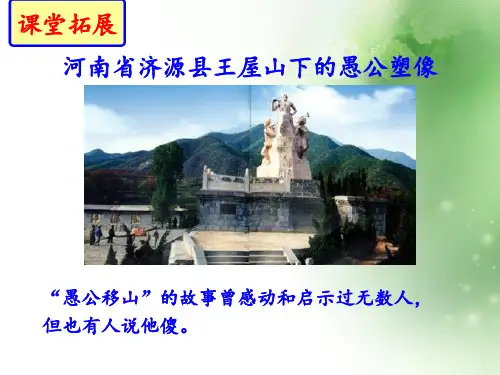
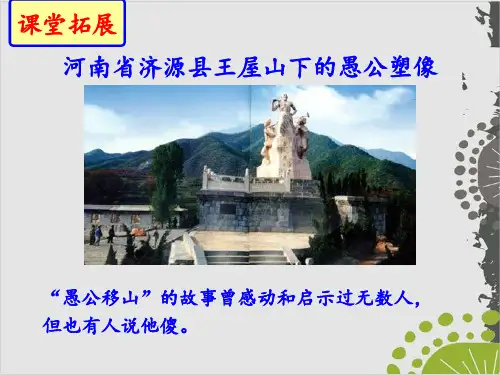

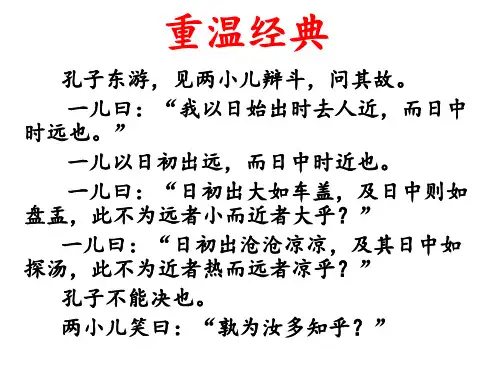
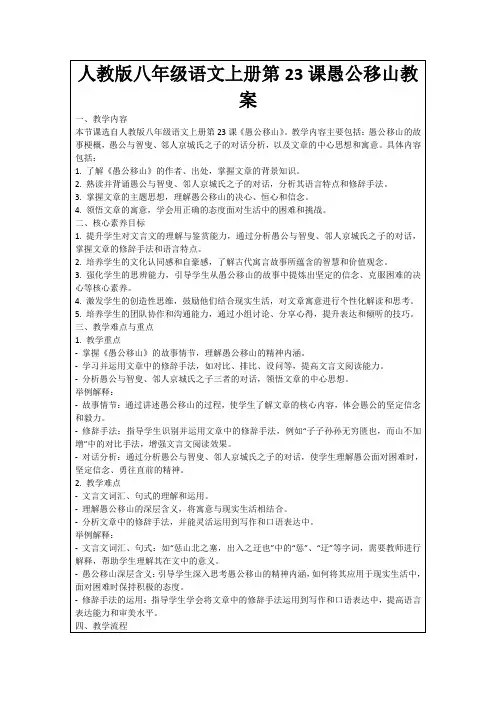
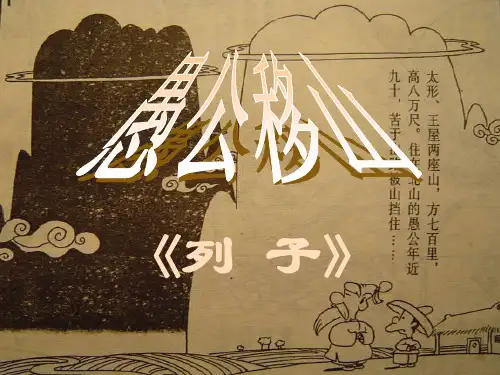
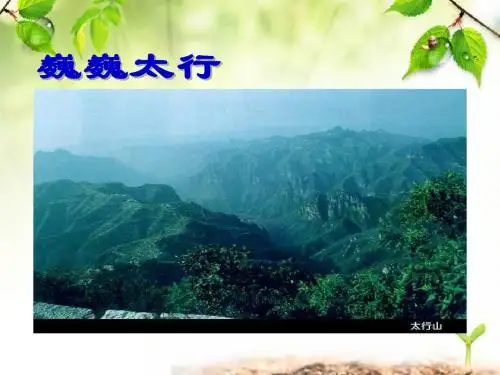
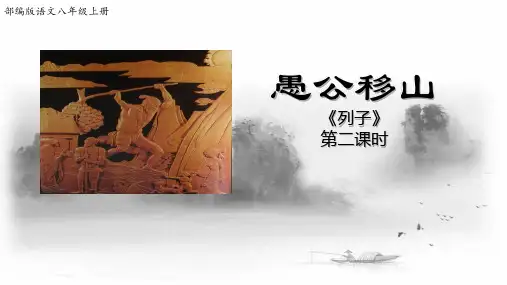
愚公移山【课题解说】愚公移山,出自《列子•汤问》,作者为战国的列御寇,叙述了愚公不畏艰难,坚持不懈,挖山不止,最终感动天帝而将山挪走的故事。
比喻做事有毅力,有恒心,坚持不懈,不怕困难。
【学习目标】1、准确熟练的朗读课文,掌握重点字词义和重点句子的翻译。
2.积累文言文的实词、虚词、辨析一词多义3.能结合注释翻译课文,了解故事大意。
4.理解文章深刻的寓意4.学习愚公身上的精神【难点解说】分析人物形象:愚公愚公要移山,不是头脑一时发热,而是经过深思熟虑的。
首先,他移山的目的十分明确。
其次,对于山能够移走这一点,愚公也是成竹在胸的。
他在批驳智叟的一段话里,就说得十分清楚。
这段话是用“顶针”的修辞方法写的,一句顶着一句,层层紧扣,充分说明子子孙孙绵延不绝的道理。
最后用“无穷匮也”做结束,肯定了人力的无穷无尽,很有说服力。
接着用“而”字一转,又指出山只能是越挖越少,不会“更加增”。
这样得出“何苦而不平”的结论就十分自然,令人信服。
这说明愚公移山的信心是在对人力和自然的发展变化关系的深刻认识的基础上建立起来的。
由此可见,愚公在移山的整个过程中站得高、看得远,考虑问题十分周密,驳斥智叟有理有据。
像这样可敬的老人,谁还能相信他是“笨老头”呢?智叟是一个自作聪明的老人。
他轻视愚公,反对移山。
智叟目光短浅,知难而退,无所作为又信口开河、好为人师,这种人自以为是,其实不过是卖弄小聪明罢了。
【主旨归纳】本文通过愚公移山的成功,反映了我国古代劳动人民改造自然的伟大气魄和坚强的毅力,也说明了要克服困难就必须下定决心,奋斗不懈的道理.【写作特色】运用对比和衬托的写法。
愚公和智叟这两个人物,就具有强烈的对比作用。
太行、王屋二山的高大,运土路程的遥远,对显示愚公的气魄,说明移山劳动的艰巨具有一定的作用。
又如写操蛇之神的“惧”和天帝的“感”,也从侧面反映了愚公的决心不可动摇。
【词语积累】1.古今异义(1)指古义:直,一直今义:手指;用手指;(2)曾古义:连……都今义:曾经(3)毛古义:草木今义:毛发(4)阳古义:山之南,水之北今义:太阳(5)阴古义:山之北,水之南今义:阴天(6)诸古义:之于今义:各个、许多(7)息古义:叹气今义:休息(8)虽古义:即使今义:虽然(9)已古义:停止今义:已经(10)方古义:方圆今义:常指矩形(11)惩古义:苦于,被... ...所苦今义:惩罚(12)苦古义:愁今义:痛苦2.一词多义(1)其惧其不已也【代词,他】其如土石何【助词,加强反问语气】帝感其诚【他】其妻献疑【他的】(2)之以君之力【的】虽我之死【助词,主谓间取消句子独立性】告之于帝【代词,这件事】跳往助之【代词,代愚公移山这件事】(3)且年且九十【将要,快要】且焉置土石【况且】(4)焉且焉置土石?【疑问代词,哪里】始一反焉【加强语气】(5)而面山而居【表示修饰】何苦而不平【表示承接】而山不加增【表示转折】3.通假字(1)指通豫南。
23.愚公移山基础闯关全练1.下列加粗字的注音有误的一项是( )A.万仞( rèn) 冀州(jì) 豫南( yù) 山北之塞(sè)B.魁父( kuí) 垣曲(yuán) 叩石( kòu) 孀妻弱子(shuāng) C.穷匮( kuì) 始龀(chǐ)箕畚(běn)一厝朔东(cuò) D.陇断( lǒng) 智叟(sǒu)荷担(hè)出入之迂(yū) 2.解释下列句中加粗的词。
(1)杂然相许( ) (2)惩山北之塞( )(3)毕力平险( ) (4)何苦而不平( )(5)寒暑易节( ) (6)惧其不已也( )(7)固不可彻( ) (8)虽我之死( )3.下列句子中不含通假字的一项是( )A.甚矣,汝之不惠B.始一反焉C.惩山北之塞D.无陇断焉4.下列语句朗读停顿划分正确的一项是( )A.曾不能/损魁父之丘B.河曲智叟亡/以应C.邻人京城氏/之孀妻有遗男D.命夸娥氏/二子负二山5.文学常识填空。
《愚公移山》选自《_________》。
____,本名列御寇,战国时____家学派代表人物之一。
能力提升全练1.根据自己的理解,用课文原句填空。
(1)愚公移山的原因:“_____________,_____________。
”(2)愚公移山的目标:“_____________,_____________。
”(3)愚公移山的方式:“_____________,_____________。
”(4)愚公认为人定胜天的理由:“_____________,_____________,_____________?”2.“阴”“阳”二字在和山水名称相连时,多指和山水相关的方位,如“汉阴”等。
我国很多城镇名称就是这样得来的。
请分别写出下列城市所处山水的位置。
(1)江(长江)阴________(2)洛(洛河)阳________(3)衡(衡山)阳________(4)华(华山)阴________3.下面是一幅漫画,请你仔细观察,说说它的寓意。
《愚公移山》预习作业
1.文学文化常识
(1)本文选自《》,作者是,名,时期思
想家,
(2)寓言一般比较短小,常常用假托的故事寄寓意味深长的道理,带有或劝诫的性质。
故事的主人公可以是人,也可以是人格化的或其他事物。
2.字词积累
给下列加点字注音。
万仞.()山北之塞.()出人之迂.()荷.担()叩.石()
箕畚
..()孀.妻()始龀.()智叟.()穷匮.()亡.以应()一厝.()朔.东()雍.南()冀.之南()3.课文结构
阅读课文,完成下面的思维导图。
4.赏析语句
(1)太行、王屋二山,方七百里,高万仞,本在冀州之南,河阳之北。
写山的面积和高度,说明了山的,为表现做铺垫。
点明地理位置,为后文埋下伏笔。
(2)其妻献疑曰:“以君之力,曾不能损魁父之丘,如太行、王屋何?且焉置土石?”
“其妻献疑”语气且十分委婉,提出了移山客观存在的,目的不是为了阻止愚公移山,而是提醒愚公及众人正视,并且设法
,从侧面愚公移山的意志之坚决。
(3)河曲智叟笑而止之曰:“甚矣,汝之不惠!以残年余力,曾不能毁山之一毛,其如土石何?”
此句通过对智叟的和描写,表明了他对愚公
的态度,使其自作聪明之态跃然纸上。
(4)河曲智叟亡以应。
此句与前文智叟对愚公的挖苦和讥笑形成,写出了“智叟”
的窘态,衬托了愚公的品格。
(5)操蛇之神闻之,惧其不已也,告之于帝。
帝感其诚,命夸娥氏二子负二山,一厝朔东,一厝雍南。
操蛇之神的“惧”和天帝的“感”,从侧面了愚公移山的、和。
《愚公移山》预习作业答案
1.(1)《列子·汤问》列子御寇战国道家无为而治(2)故事讽刺动植物
2.rèn sè yū hèkòu jī běn shuānɡ chèn sǒu kuì wúcuò
shuòyōnɡ jì
3.(1)率子孙荷担,叩石垦壤(2)寒暑易节,始一反焉(3)愚公不改初衷(4)天帝助其实现愿望
4.(1)高大愚公的精神山被移走(2)关切困难移山的困难克服困难衬托(3)神态语言轻视、挖苦、讥笑(4)鲜明对比哑口无言不畏艰险、迎难而上(5)衬托决心信心恒心。